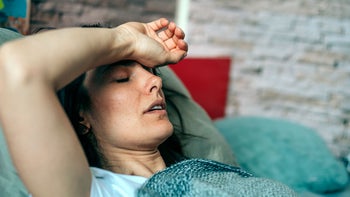Can’t Sleep During Menopause? 3 Women Share Tips for Getting Some Rest
Key takeaways:
Menopause can bring on sleep struggles such as insomnia and night sweats.
Tips for getting better sleep during menopause range from mattress coolers to meditation.
For some women, simple practices like establishing a bedtime routine make for a better night’s sleep.

Menopause is a time of life that triggers hormonal changes and signals the end of a woman’s reproductive years. It also can trigger hot flashes, night sweats, mood swings, and sleep disturbances.
To get better sleep during menopause, some people turn to lifestyle changes such as regular exercise, a healthy diet, and stress-reduction techniques like meditation. Others suggest wearing loose-fitting clothing or turning on a fan in the bedroom.
Here are strategies three women say made a difference for them when it came to improving their sleep quality and well-being while dealing with the challenges of menopause.
1. Create a bedtime routine
Skylar Liberty Rose runs a midlife women’s club and considers herself to be “very much a pro-aging advocate.” She has a photographic diary featured in the National Women’s History Museum that explores the concepts of aging, identity, and perimenopause.
In her own experience, her biggest symptom was being able to get to sleep and stay asleep.
“Insomnia is one of a number of symptoms,” she says. “Without good sleep, we’re just not well-equipped to deal with all of the other symptoms that we might be experiencing.”
She says she regained control of her sleep quality by focusing on creating a bedtime routine by making small changes — such as focusing on nutrition and self-care, limiting screen time, and regulating the temperature of her bedroom.
“Despite my love of all things sweet, keeping my sugar intake to a minimum has helped to improve both my blood sugar levels and my chances of getting a restful night’s sleep,” she says. “I’ve also completely cut out caffeine and alcohol. Limiting screen time before bed has been a game-changer. My apps go dark by 9PM, and I try to use the last hour or so before bedtime to listen to a podcast or read.”
Skylar says she also uses a CBD lotion that is lavender-scented while getting ready for bed which she finds soothing and relaxing. Keeping her bedroom cool has helped to combat the dreaded night sweats and hot flashes that so many people experience during this phase of life.
2. Consider getting a mattress cooler
For 51-year-old Ginger Madden, living in Parrish, Florida was already “hot and swampy,” she says. Then, she says, menopause wreaked havoc on her ability to get a good night’s sleep.
“The worst part of it has been the night sweats,” she says.
While she tried several over-the-counter sleep aids and supplements, she never felt like they offered much relief. Then, she found a product that became her must-have: a mattress cooler.
“Basically, it’s a big mattress pad with thin tubes inside it,” she says. “You connect the pad to the cooler unit, which holds distilled water. The cooler unit then chills the water and circulates it through the pad. It is definitely a game-changer.”
Now, she says, she sleeps with less tossing and turning and doesn’t feel as sweaty at night.
Ginger says changing her bedding also helped. She finds that using 100% cotton or bamboo sheets has made her feel cooler.
3. A hormone patch and mindfulness might be the answer
For Amy Cooper, a 49-year-old mindset coach in Austin, Texas, her perimenopause experience has been, well, sweaty.
“I would wake up in the middle of the night just like completely soaking wet,” she says. “Then, I would start to get cold. This was affecting my sleep and became a vicious cycle.”
She went to her doctor and asked to have her hormones checked. Her doctor prescribed an Estradiol patch that Amy says eliminated her night sweats. But, Amy says, she still struggled with anxiety that was so severe that it disrupted her sleep. So, she also started using emotional freedom technique (EFT) tapping, meditation and other mindfulness tools to help manage her anxiety.
“My sleep is much better now, although not perfect,” she says.
4. Educate yourself and find resources
One sentiment these women share is that they feel that their concerns were often dismissed, ignored, or minimized. They encourage others going through this phase of life to educate themselves on the changes their bodies are going through, and to be their own advocate in finding resources and assistance.
“Our doctors don’t really talk to us about menopause or perimenopause, and [many] women don’t understand that hormonal changes can start as early as 35 years old,” Amy says. “It can really feel like you’re going crazy. But it’s normal — and there are ways to feel better.”
Why trust our experts?


































